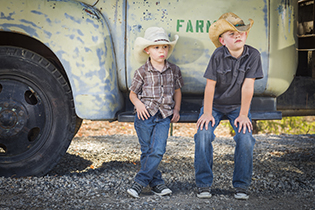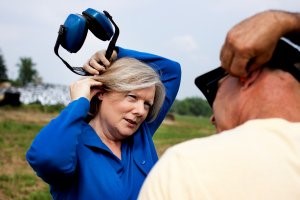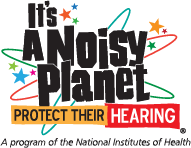
Did you know that working on a farm can be hazardous to your hearing health? Tractors, combines, chainsaws, and squealing animals are just some of the loud sounds to which farmers are frequently exposed. These sounds are loud enough to cause noise-induced hearing loss (NIHL) over time. In fact, farming is one of the riskiest occupations when it comes to hearing loss, according to the Occupational Safety and Health Administration.
Marjorie McCullagh, Ph.D., R.N., director of the Occupational Health Nursing Program at the University of Michigan School of Nursing, has spent more than a decade studying how to promote hearing health among farm operators and farm youth. In a study funded by the National Institute on Deafness and Other Communication Disorders (NIDCD), McCullagh found that mailing adult farm workers an assortment of hearing protectors, such as earmuffs and different types of earplugs, was more effective in increasing the farmers’ use of hearing protection than providing online educational information on hearing safety.
By collaborating with the American Farm Bureau Federation, McCullagh was able to reach farmers from farming communities nationwide to participate in the study. Nearly 500 adult farm operators (with an average age of 45) received 1) interactive web-based information that promoted hearing safety behaviors; 2) static web-based information that consisted of informational brochures on hearing protection; 3) a mailed assortment of hearing protectors only; 4) hearing protectors with the interactive online information; or 5) hearing protectors with the static online information.
Over a 12-month period, hearing protection use in all five groups increased: beginning at 29.5 percent, average hearing protection use among all participants increased to 48.7 percent at six months and 49.3 percent at 12 months. Reports from farm operators who received the mailed hearing protectors, whether alone or in combination with online information, showed a greater increase in hearing protection use than participants receiving information only. Among those who received the hearing protectors, the group who also received interactive web-based information showed significantly higher hearing protection use than those who received static online information.

Marjorie McCullagh, Ph.D., RN, demonstrates the proper use of hearing protection. Source: University of Michigan School of Nursing
McCullagh has also focused on educating children who work or live on farms about NIHL. In another NIDCD-supported study, McCullagh partnered with the University of Michigan and the Progressive Agriculture Foundation (PAF) to test the effectiveness and sustainability of hearing health education programs among more than 2,000 children, ages 8 to 12, attending the PAF’s Safety Day, a one-day training program for youth on farm safety. Participants received a face-to-face lesson on common farm noises, how they might affect the ears and hearing, and ways to prevent NIHL. Some participants also received a follow-up lesson online that reinforced the lessons taught in the face-to-face session. Early results found the face-to-face lesson to be effective in positively influencing hearing safety behaviors, while the internet-based follow-up lesson had minimal effects. The PAF has now adopted the face-to-face lesson as a part of its regular Safety Day curriculum, which reaches up to 100,000 farm and rural youth annually.
In August 2018, the American Academy of Nursing recognized McCullagh for her program, Quiet4Healthy Farm, which educates farm operators face-to-face, by mail, and online about ways to prevent NIHL. McCullagh is also collaborating with the University of Iowa on a smartphone app that will help make hearing health and safety information more accessible to the millions of adults and children who work on, live on, or visit farms each year.
The research was supported by the NIDCD through grants R01-DC010827 (adult farm operators) and R01-013885 (farm youth). In addition, 3M Corporation supplied hearing protectors for the study on hearing protection use among adult farm operators.
If you work on or visit a farm, remember to take steps to protect your hearing:
- Move away from the noise, when possible.
- Wear earplugs or protective earmuffs.
- Lower the volume, if possible.
To learn more about farm sounds that can damage your hearing, download Noisy Planet’s How Loud is Too Loud on the Farm? bookmark.
Last Updated Date



